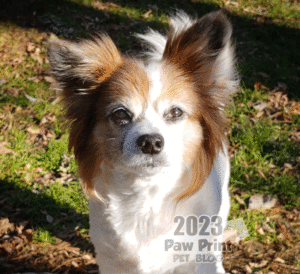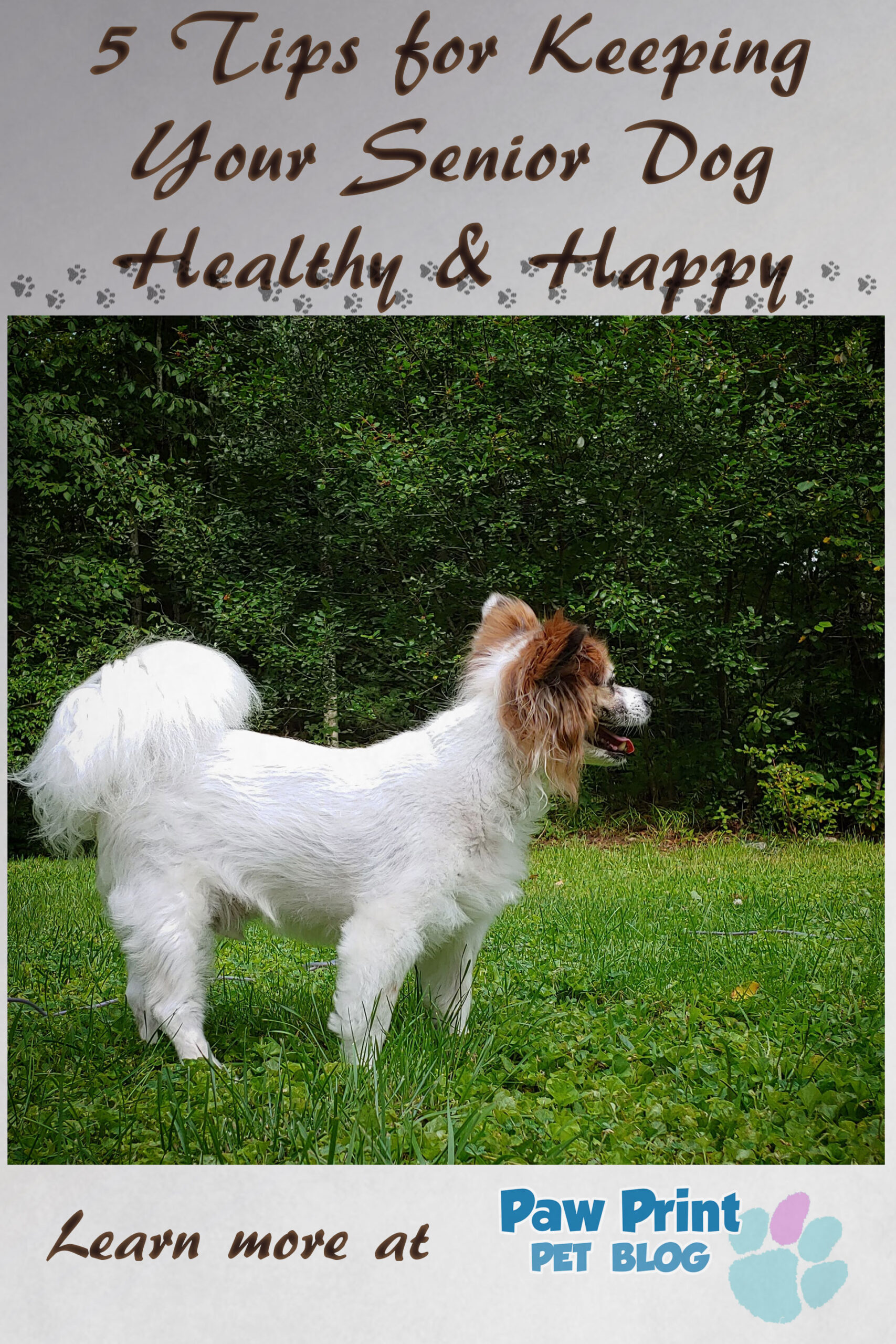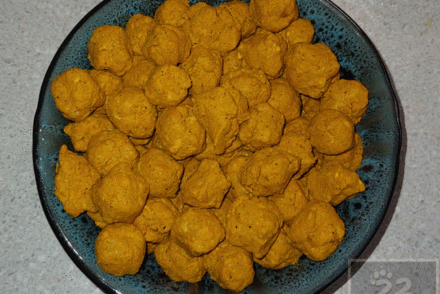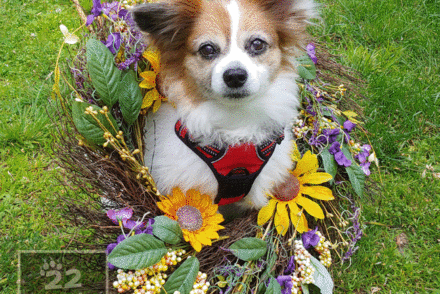My amazing papillon, Kitsune, will turn 15 the day after Christmas this year. If you follow us on Facebook, you might know we’ve been dealing with some health issues with Kit lately. Thankfully, though, all things considered, Kit is doing quite well for an older gentleman. If it’s true that one human year is equal to seven dog years, Kitsune is approaching the ripe old age of one hundred and five! You’d never guess it by looking at him, though. Kit still loves running zoomies around the house, wrestling with his little brother Fenrir, and exploring in the woods. Oh, and begging for food. He still begs with all the enthusiasm of a puppy!
Whether you share your life with a distinguished senior “pup”, or are just embarking on the adventure of raising a puppy, everyone wants their dog to live as long as possible! Dogs’ one flaw indeed is that they don’t live as long as we do. Luckily, there are some things you can do that can not only potentially help your senior dog to live longer, but can help make your best friend’s golden years happier as well!
Post Contents:
Feed Your Dog High-Quality Food
I don’t generally recommend specific dog food brands on my blog. I wrote a whole post about why this is the case, summarized by the fact that each dog, and each dog owner, are individuals. I am a huge proponent of feeding the dog in front of you. What’s right for one dog isn’t going to be what’s right for all. Different dogs have different needs, and different owners are going to have different living situations too. Not every owner wants to, or can, spend hours a week home cooking complex diets for their dogs. Not everyone can afford the most expensive super premium dog foods, especially if you’re feeding a large breed dog. And not every dog is even going to do best on these types of diets!
When it comes to feeding dogs, senior dogs or otherwise, my advice to owners is to do the best you can for your dog. Research, talk to your vet and/or a dog nutritionist, and experiment a bit with different foods. Research, and find the diet that works the best for you and your dog!
I recently changed Kitsune’s diet a bit based on his current needs. One of his most recent health issues warranted a food switch for him. That’s another thing to keep in mind, what works best for your dog now might not always be the perfect food for him/her. As your dog’s health and needs change, what diet works best for them will likely change as well.
Supplement as Needed
I’ve always, at least partly, attributed Kitsune’s health and vibrance well into his teens to the supplements I use to help support him. Kitsune has had arthritis for years, for example, but thankfully we’ve been able to avoid pain medications such as NSAIDs by using supplements such as Dasuquin, a high quality omega-3 supplement, and turmeric. Supplements often come with a lot less potential side effects than medications, but can be effective at treating some health issues. Other supplements don’t so much treat issues as help support our pet’s natural systems. I give my dogs a mushroom supplement, for example, to help support their immune systems and for general health.
Like with food, supplements should be catered for your individual dog. I have two dogs, and I don’t give them the same supplements. I base what supplements I give to each of my dogs on their unique, individual needs. Remember that it is possible for supplements to interact with certain medications, and with each other. If you are unsure about whether a supplement is safe to offer your dog you should discuss it with your pet’s vet.
Pain Control as Needed
Getting old can suck sometimes. Dogs, like humans, are prone to developing age related conditions that can, unfortunately, cause discomfort and pain. While I do prefer using more natural supplements and treatments when possible, owners should not be afraid to talk to their vets about stronger pain control options if/when they are needed. Please don’t allow your senior dog to suffer in pain when their are options to keep them more comfortable!
Keep in mind that pain control doesn’t always have to come in the form of medications either. Depending on your dogs condition, sometimes alterative treatments such as laser therapy, physical therapy, and acupuncture can be great ways to help manage pain. No matter what form of pain control you go with, find something that works for your dog. No one wants to see their beloved senior pup in pain, and eliminating chronic pain can go a long way towards improving an old dog’s qualify of life.

Appropriate Exercise
Senior dogs don’t typically have the same exercise requirements as their younger counterparts, especially when/if they experience any health issues or effects of old age. That doesn’t mean, however, that senior dogs shouldn’t be exercised at all. Over a year ago now, when my senior, Kitsune, was diagnosed with cervical IVDD, he required 8+ weeks of really strict rest. After 8 weeks, his vet gave us the go ahead to slowly start working Kit up to being able to exercise again. The amount of exercise he receives now, however, post IVDD and with arthritis, looks different than when he was younger.
On an average day, Kitsune gets three walks a day of about 20 minutes each. A few times a week we take him on short, easy hikes, or allow him to spend more time outdoors exploring in the woods. Light exercise, that they can handle without getting sore, can be really beneficial for senior dogs. In fact, out vet attributes the fact that Kit moves so well despite having pretty advanced arthritis with the fact that he gets regular exercise. Regular, low impact, exercise can help keep muscles strong and can reduce the amount of pain and stiffness that is associated with age related conditions, notably arthritis.
Remember that, while regular exercise can be very beneficial for senior dogs, don’t overdo it. If your dog is not currently used to exercising it’s best to take things slow and work your way up to a moderate, regular exercise routine. Low impact exercises such as walking, swimming, and gentle play often work best for older dogs, especially older dogs with joint, or other health, issues. Talk to your dog’s vet if you have any concerns or questions about how much, and what types, of exercise your individual dog can tolerate.
Mental Stimulation
 Although I’ve listed it last, I think this is one of the most important tips for keeping your senior dog happy and healthy! Mental “exercise” can be just as important as physical exercise is. One thing I’ve been super thankful for is the fact that, although he’s experienced some physical limitations in his older age, mentally Kit is the same dog now that he’s always been. I make it a point to keep him entertained and engaged on a daily bases. Because, let’s face it, mental health is important. Your dog, no matter his age, isn’t going to be as happy as he could be if he’s just sitting around doing nothing day after day.
Although I’ve listed it last, I think this is one of the most important tips for keeping your senior dog happy and healthy! Mental “exercise” can be just as important as physical exercise is. One thing I’ve been super thankful for is the fact that, although he’s experienced some physical limitations in his older age, mentally Kit is the same dog now that he’s always been. I make it a point to keep him entertained and engaged on a daily bases. Because, let’s face it, mental health is important. Your dog, no matter his age, isn’t going to be as happy as he could be if he’s just sitting around doing nothing day after day.
Providing mental stimulation can sometimes be more challenging if you have a senior dog with physical limitations. I struggled a bit, for example, with Kit when he was healing from his IVDD. I couldn’t take him for walks, or even give him toys or chews because he had to make sure he was moving his neck as little as possible. During his IVDD recovery, I played music for him, put the TV on, and spent as much time as possible with him so he wouldn’t feel lonely.
Once he recovered and got the all clear from his vet, we graduated to low impact sniff walks around our neighborhood, chews and toys, training sessions, nose work, etc. Thankfully there are a lot of lower impact activities you can do with older dogs to help keep them mentally stimulated. Old dogs very much can learn new tricks, and I still regularly do training sessions with Kitsune. As a senior he learned nose work. He loves going out in the woods around our house with me to look for shed deer antlers. He loves his daily walks, although they are at a slower pace now than they used to be. Even just spending some extra time sniffing around the yard can be really rewarding for a dog.
Regular mental stimulation helps keep senior dogs happier! And in dogs, like in people, positive emotions like happiness can actually help us lead healthier lives. Positive emotions are thought to help promote a stronger immune system, and they may even help guard against disease such as cancer!
Comment below!
Remember that if you have any questions or concerns about whether your senior dog can tolerate a new food, supplement, or exercise routine it’s important to consult with his/her veterinarian. It’s important to recognize our senior dog’s limitations, because the last thing we’d want to do is make them sick with a new food or supplement or overdo a new exercise and cause them pain.
If you have a senior dog, what are some things you do to keep him/her healthy and happy? What are some challenges you’ve faced as your dog has aged, and how did you overcome those challenges?

We’ve, unfortunately, been dealing with content scrapers stealing our articles. You shouldn’t be seeing this article on any site other than pawprintpetblog.com! If you’re reading this article on any other site, we’d love for you to take the time to contact us and let us know and, if you have the time, stop by and visit us on our official site! Thanks you.





No Comments